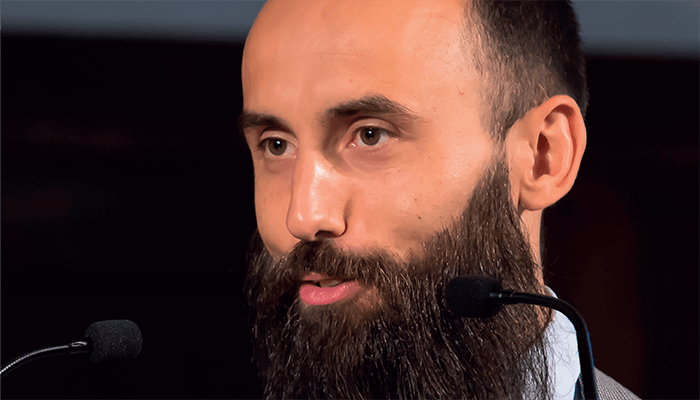Tell us about your career progression over the past four years…
Four years ago, I was transitioning from a status of “advanced/mature” postdoc to my position as tenure-track Assistant Professor in analytical chemistry. A significant change that accompanied this has been teaching courses and supervising students. Teaching for me has been both a struggle and a joy. The struggle comes from the intense preparation it requires, but it is incredible to transmit helpful skills and concepts to my students and see them progress.
I have thoroughly enjoyed carrying out my research with students and colleagues during these four years. Currently, I am working with a small group of two PhD students and a postdoc. It has been amazing to see our ideas realized and published. Without motivated people, I would probably have given up on many of them before achieving a result. (I tend to be a little impatient!)

Any highlights?
The biggest highlight by far has been fatherhood. I think people forget that it is possible to continue in academia and also be a parent. I am really enjoying taking the time to be with our tiny little human.
Unfortunately, there were lowlights, too – on the academic side. Failures are a big part of my work and it is hard to share them. One of my most significant disappointments so far came from a grant application. Twice, I reached the final stage of an application that could have significantly impacted my career; I received very high scores, but not high enough to be awarded the grant. I have discovered that there is a lot to learn from failures – it is normal to fail and I think it is important to share that.
Are you working on anything particularly exciting at the moment that you would like to share with us? Any goals for the future?
I haven’t decided whether it is a blessing or an obsession, but I am excited about developing separation methods coupled with mass spectrometry. For years, the love and hate between the separation and mass spectrometry communities have shaped analytical science. As a result, many separation methods (1D and 2D) took a long time to reach mass spectrometry – or didn’t reach it at all.
One of my research aims is to develop advanced LC-MS technology. I am excited about the results we are getting in developing materials and methods for proteoform hydrophilic interaction chromatography (HILIC) and size exclusion chromatography (SEC) and exploring how low-flow chromatography can facilitate LC-MS coupling. Polymers can be complex; it’s exciting to detect their complexity and “solve the puzzle” by assigning the many peaks to molecular structures.
However, it’s not all about methods. One of my current struggles is to get more connections to LC-MS applications. My aim (and that of many others in the community) is to perform analysis that gives not only a list of molecular structures, but also information about affinity, activity, or performance connected to specific structures, such as proteoforms.
As for the future, I don’t have a specific career goal. Being in academia has a lot of ups and downs. Honestly, I am still figuring out how much I like it.
What is the single most exciting development in your field today?
In my opinion, the single most exciting development in my field is charge detection mass spectrometry. This technology can help realize amazing results in analyzing large and complex molecules. I’d love to work on this and see what needs to be done to make it compatible with, and possible to be coupled with, separations. Of course, I would need to secure funds – I could complain extensively about this, but I won’t take you down that rabbit hole.
Any advice for young people entering analytical science?
To young people entering analytical science, I suggest being open to learning about and practicing various analytical techniques. All of these techniques have one thing in common – the production of (a lot of) data. Learn how to understand, analyze, and interpret your data. Algorithms and computers can only do so much for you – I, myself, am useless in this area and wish to improve. It is an absolutely invaluable skill to have.




